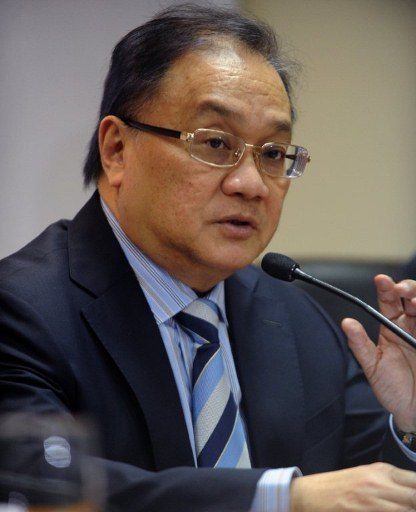SUMMARY
This is AI generated summarization, which may have errors. For context, always refer to the full article.

MANILA, Philippines [UPDATED] – Amid geopolitical tensions between the Philippines and China over the disputed West Philippine Sea (or South China Sea), the oil and gas exploration firms of each country are engaging in separate commercial negotiations.
In a press briefing on Tuesday, May 8, Manuel V. Pangilinan, chairman and CEO of Philex Mining Corp., confirmed that he was in China last week after he received an invitation from China National Offshore Oil Corporation (CNOOC), one of China’s 3 state-owned oil firms.
“Yes I was Beijing last week. And, yes, I met with CNOOC,” Pangilinan said.
When asked what were discussed with the CNOOC officials, he admitted that the main topic of conversation was Service Contract 72 (SC-72).
He said they discussed forming a partnership to explore the resource rich Recto Bank. “Any discussions with them at this stage is privileged,” he said, adding the Philippine government was aware of the talks.
“We are business people. We don’t have gunboats to deploy so it could affect the schedule if certain events happen in that area,” he added. “(Recto Bank) will take 6 to 10 years to develop, that’s why it’s important for us to start now.”
Resources, standoffs
The Philippine government, in an exercise of its sovereign right, granted a unit of Philex Mining a permit to explore the Recto Bank in west Palawan through SC-72.
Philex’s unit, Forum Energy, would be investing around $75 million to continue with its drilling the fields in Recto Bank, which showed a potential of producing 16.6 trillion cubic feet of gas.
This makes the natural gas reserves at Recto Bank far bigger than the gas reserves at nearby Malampaya, Philippines largest natural gas producer to date.
Recto Bank is about 148 kilometers off the Philippine island of Palawan. But China claims nearly all of the disputed area, even waters close to the coasts of Southeast Asian nations.
In 2011, the Philippines accused Chinese vessels of harassing a Philex-contracted exploration vessel at Recto Bank, one of the 1st incidents in a series that has dramatically escalated tensions between the two countries. Taiwan, too, has previously protested the exploration activities in Recto Bank.
The Philippines and China have, for the past month, stationed ships at Scarborough Shoal, more than 400 kilometres to the north of Recto Bank, in an effort to assert their sovereignty over that part of the disputed sea.
Foreign partner
Pangilinan said that, as with the large Malampaya project, it would be necessary to bring in a foreign expertise and capital.
As for expertise, CNOOC announced — also on Tuesday, May 8 — that it will launch China’s 1st independent deep-water oil drilling rig in the disputed sea near Hong Kong. The rig, which will start operations May 9, could drill up to 1,500-meter depth. .
“Whether it is the Chinese that we partner with or the non-Chinese, I think it is necessary for us to partner with an international [firm]. I think our government knows that as well,” he said.
“We intend to implement the schedule as has been approved by the government,” he said, referring to a work program that sets out the schedule of exploration and drilling activities, as well as the investment his group would pour into the project.
In a speech before Congress last year, Philippine President Benigno Aquino vowed to defend the country’s claim on Recto Bank.
However, Aquino has also since expressed a willingness to jointly develop the area, as long as it is done under Philippine law. – Rappler.com, with Agence France-Presse
Click on the links below for more.
Add a comment
How does this make you feel?
There are no comments yet. Add your comment to start the conversation.